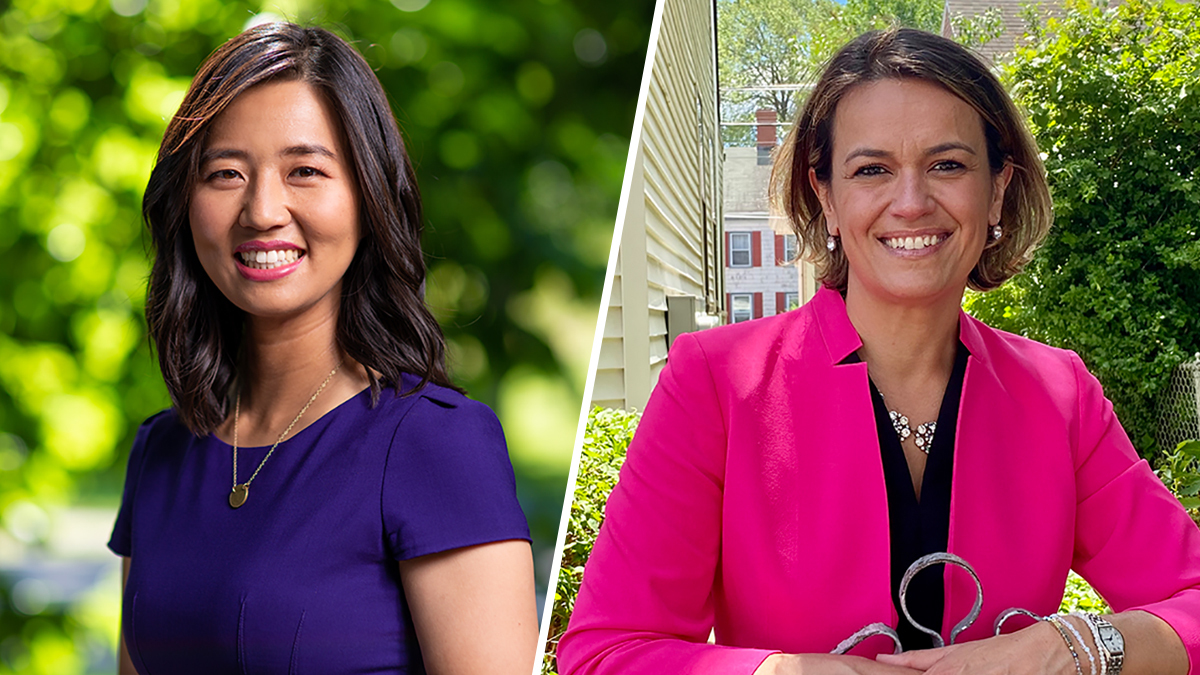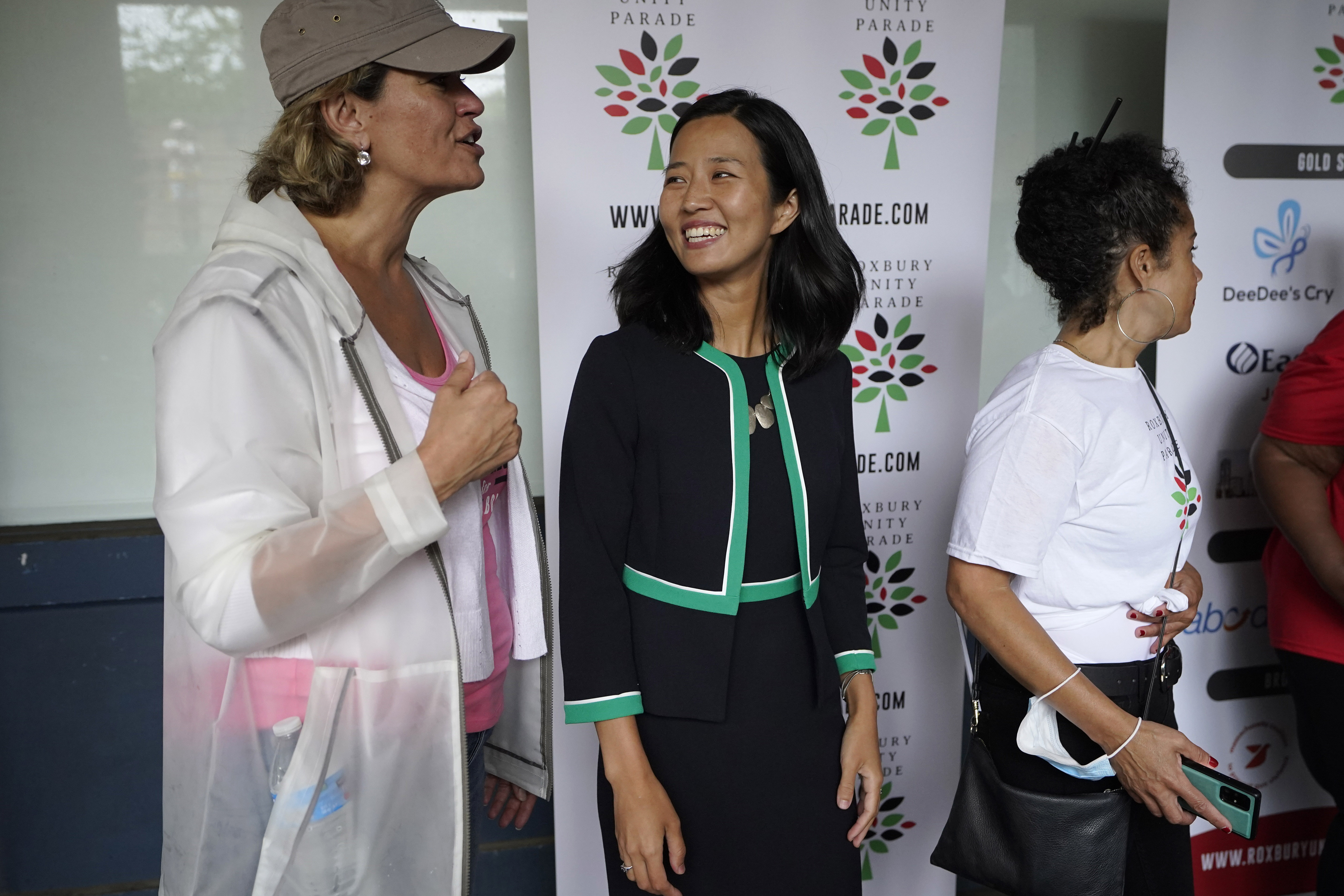Boston voters will choose between Michelle Wu and Annissa Essaibi George in the Nov. 2 general election.
The polls will be open from 7 a.m. to 8 p.m. Click here for details on your polling location.
WATCH ANYTIME FOR FREE
>Stream NBC10 Boston news for free, 24/7, wherever you are. |
The preliminary election on Sept. 14 saw the field of five mayoral candidates cut down to two. City Councilors Wu and Essaibi George earned the most votes, eliminating Mayor Kim Janey, City Councilor Andrea Campbell and John Barros from the race.
If you don't know who to vote for yet, we have some resources to help.
Get updates on what's happening in Boston to your inbox. Sign up for our >News Headlines newsletter.
Get to know the candidates
Wu, 36, was the first Asian American woman to serve on the Boston City Council, having first been elected in 2013 at the age of 28. She became the first woman of color to serve as council president when she was elected in January 2016.
Her parents immigrated to the United States from Taiwan in the early 80s, before she was born. She is fluent in Mandarin and Spanish.
Wu graduated from Harvard University and Harvard Law School. It was while she was a student at Harvard, as her parents were separating, that Wu noticed her mother showing signs of mental illness. Shortly after graduating, just months into her new job, Wu was called home to Chicago by her younger sister, with their mom in a full-blown mental health crisis.
After stabilizing her home life, Wu moved the entire family back to Boston, where she began to attend Harvard Law School. Wu believes the move saved her mother's life. Her mom was diagnosed with late onset schizophrenia and was inpatient at Massachusetts General Hospital.
Wu got her start in City Hall working for Mayor Thomas M. Menino as a Rappaport Fellow in Law and Public Policy. She later served as statewide constituency director in the U.S. Senate campaign of her former law professor, Elizabeth Warren.
She is a former restaurant owner, legal services attorney, and legal guardian of her younger sisters. She also has a background in community advocacy, having worked at the WilmerHale Legal Services Center in Jamaica Plain and at the Medical-Legal Partnership at Boston Medical Center.
Wu lives in Roslindale with her husband, Conor, and her sons, Blaise and Cass. Wu and her family share a two-family house with her mother.
Essaibi George, 47, is also the daughter of immigrants — her father, Ezzeddine, immigrated to the U.S. from Tunisia in 1972, and her mother, Barbara, was born in a displaced persons camp in Germany after World War II. She grew up in Dorchester and was elected to the Boston City Council in 2015.
She graduated from Boston Technical High School, going on to earn a bachelor's degree in political science from Boston University and a master's of education from the University of Massachusetts Boston.
Starting in 2001, Essaibi George taught economics, business management and health and human services to juniors and seniors at East Boston High School. She also served as the assistant softball coach.
Essaibi George is also the founder and owner of Stitch House in Dorchester — a brick and mortar retail shop that sells yarn and fabrics. It also offers classes in knitting, sewing, quilting and crochet — all hobbies Essaibi George has enjoyed since childhood.
She and her husband, Dorchester native Doug George, have four boys together: Douglas, and triplets, Charlie, Kayden and Samir.
More on Boston's mayoral race
Watch the debates
Wu and Essaibi George took part in an hourlong debate hosted by NBC10 Boston, NECN and Telmundo Nueva Inglaterra on Oct. 19.
The wide-ranging discussion touched on many issues facing Boston.
The candidates' second head-to-head debate was by far the most heated yet, and both Essaibi George and Wu called one another out for lying, or using "false statements."
Among the times the candidates accused each of other of lying was when they discussed implementing measures like the city adding 19 clinicians to Boston's crisis response protocols.
"I'm disappointed to see a pattern of false statements being made here. I'm proud that over the time on the City Council I've been consistent in pushing for reforms that are needed," Wu said. "There's a clear difference in this race between continuing the status quo of choosing to just try to nibble around the edges of the changes that we need, or truly ensuring that we are bringing community in to deliver the bold changes that are necessary and possible in this moment."
"You're taking credit for something that I've done as a member of the City Council," Essaibi George shot back. "It is my work, as a member of the Boston City Council, that led to having 19 clinicians that are working every day to respond to mental health crises across our city. That is not your work. Please don't take credit for it."
Wu countered that the effort was spearheaded by Ayanna Pressley when she served as a city councilor -- she's now a congresswoman representing Boston and some suburbs.
"I was proud to support the work that happened on the council in pushing for the number of clinicians to go from two to 19, and also to have been around before you join the council when then Councilor Ayanna Pressley led the charge on this," Wu said. "Getting even to 19 clinicians is nowhere near the scale of change that's needed. There are hundreds of thousands of residents in our city who are demanding a better response to crisis, who are reporting and coming and telling us that what's happening now the status quo is not working, it is not serving our residents."
You can also watch the full debate below:
Earlier in the campaign, the two candidates took part in another debate on NBC10 Boston, NECN and Telemundo Nueva Inglaterra that also included their three other opponents in the preliminary election.
During that debate, the candidates were asked to grade Boston's handling of the COVID-19 pandemic.
Wu gave the city a C+, saying that "we need to do better about closing the gaps and addressing the issues that this pandemic has exacerbated, but were already present in our communities for a long time before."
Essaibi George gave Boston a C. "Certainly we have to do more across our city," she said, adding that she'd like to see testing ramp back up as breakthrough cases continue.
Both stressed the importance of vaccines and masks in reference to keeping children safe from COVID-19 in Boston's schools.
Essaibi George touted her position as the only candidate on stage who has worked as a teacher, spending 13 years in the classroom grading students.
"We've got to exist in reality. The masks aren't coming off this school year. I think it's important when we make decisions that we're basing it on the science," she said.
"I do support ensuring that we continue to mask up, and that we are using every bit of our public infrastructure to continue closing vaccination gaps," Wu said. "When that approval comes for children under 12, we should use our schools as a platform to be able to vaccinate, so that we can meet families right where they're at."
Another topic discussed was police reform, with Essaibi George — a more moderate candidate who was endorsed in May by former Boston Police Commissioner William Gross — calling to hire more officers, staking out a position in contrast to her opponents.
"I am the only the candidate on this stage, on this panel this evening, who is committing to investing in public safety for our city," Essaibi George said. "As mayor, I am committed to having a safe city — not defunding public safety in this city. We can talk about real reallocation, we can talk about reinvestment, that's just another word for defunding public safety in this city."
"We know that these issues are not new, activists and community members have been talking about them for years," Wu said of the issue. "We need a wholesale new approach to the structures of our police department and the culture of how we interact with our residents to build trust across our communities."
Here are some more key takeaways from the debate.
You can watch the full debate below:
A look back at the preliminary election
September's preliminary became a race for second place, with Wu heavily favored in the polls before election day. After the votes were counted, she led Essaibi George by an 11-point margin. But 45% of the vote went to other candidates, and Secretary of State William Galvin said 108,181 votes were cast — representing just a quarter of Boston's 432,097 registered voters — so the race remains wide open.
The city was slow to provide official results, but Wu was the first candidate to speak on election night, expressing confidence to her supporters in Roslindale that she had enough votes to advance.
Essaibi George struck a celebratory tone as she addressed her supporters in Dorchester after Campbell conceded.
The following morning, Wu hit the campaign trail once again, speaking at the Forest Hills MBTA station in Jamaica Plain.
"I'm excited to have the chance to continue this conversation with voters. We are seven weeks from the election, but we are in a moment of time where we have to act as a city," she said. "I'll continue to do what we've been doing from day one, a year ago today."
Essaibi George did the same, greeting supporters at Mike's Diner in the South End, criticizing some of Wu's plans as "unrealistic."
Watch the interviews
NBC10 Boston and NECN have interviewed Wu and Essaibi George multiple times. Below, you can see what they told Alison King, Sue O'Connell and Kwani Lunis.



